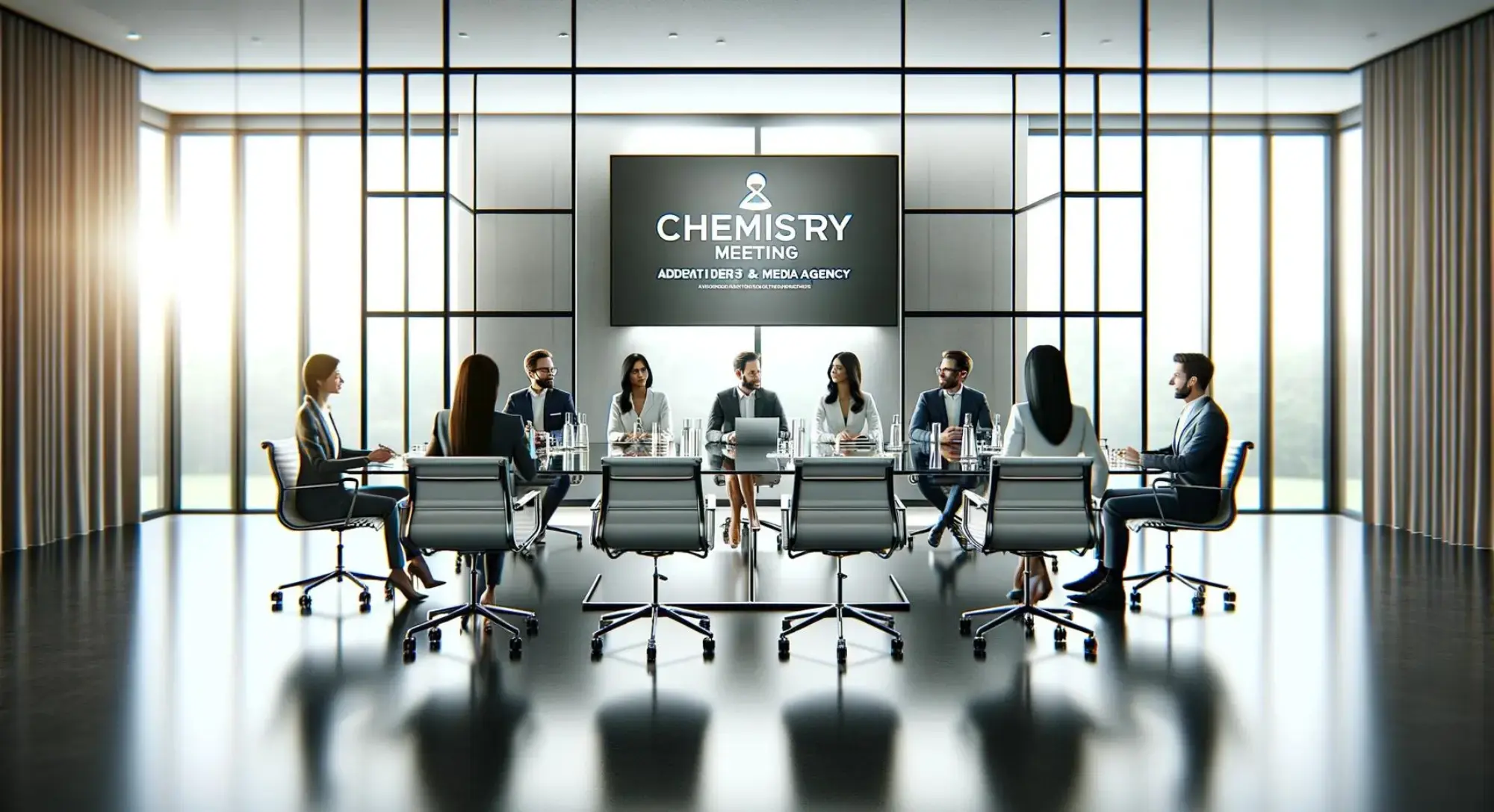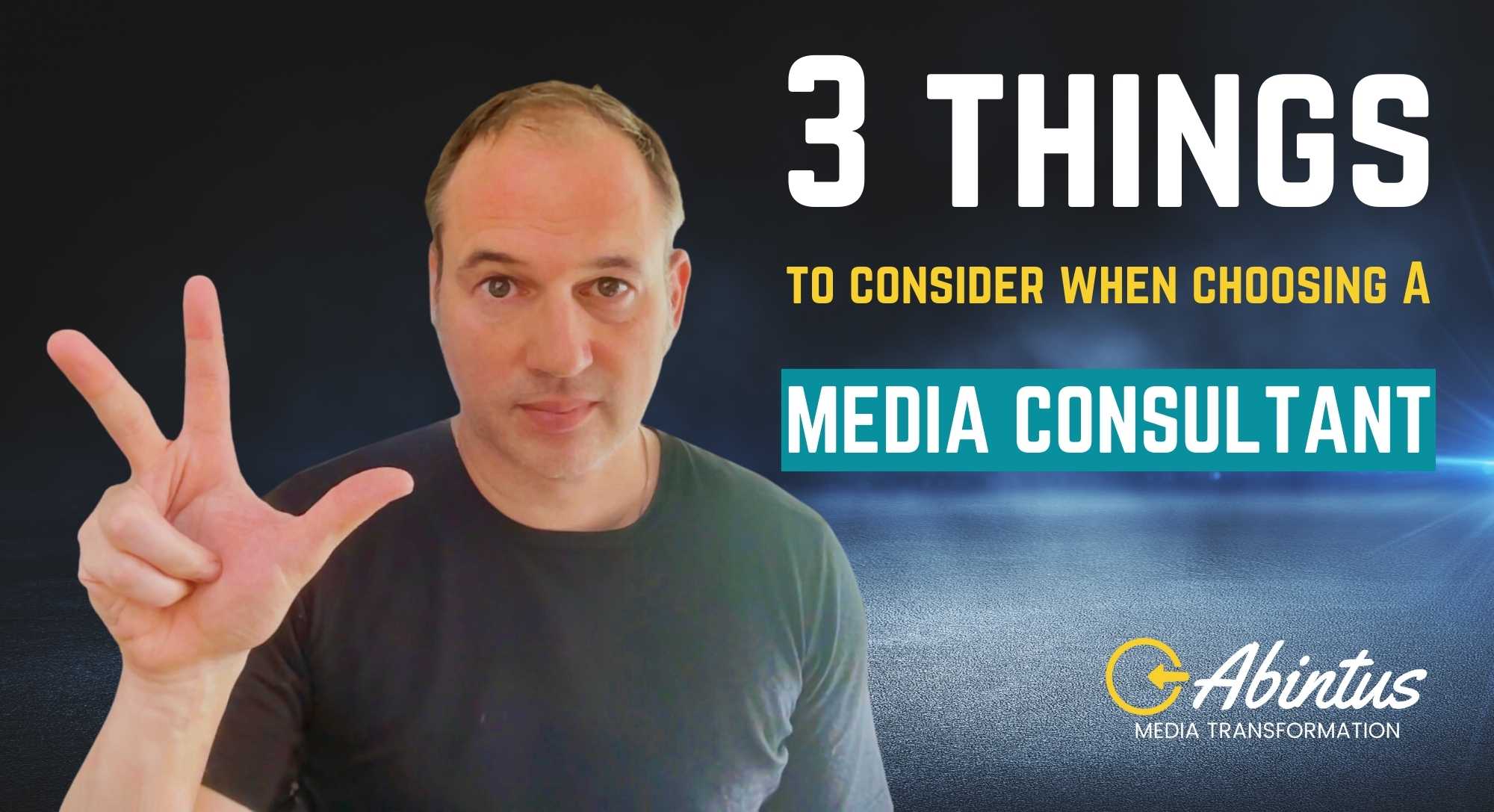As a global media consultancy, Abintus has had the privilege of running numerous media agency pitches over the years.
Through our extensive experience, we've discovered that Chemistry Meetings, when executed properly, can provide invaluable insights and significantly enhance the media agency selection process.
However, in my 25 years of international media career, I've also witnessed instances where Chemistry Meetings have fallen short, resulting in a waste of time and resources for both advertisers and participating media agencies.
The difference between a successful Chemistry Meeting and a fruitless one often lies in the preparation and approach taken by all parties involved.
In this article, I will be sharing my expertise on how to make Chemistry Meetings a triumph and an indispensable step in the media agency pitch process.
By implementing the best practices outlined here, advertisers and media agencies alike can unlock the full potential of these meetings, fostering stronger partnerships and driving better results.
What are Chemistry Meetings?
Chemistry Meetings are face-to-face encounters between advertisers and media agencies during the agency selection process.
These meetings provide an opportunity for both parties to assess compatibility, discuss expectations, and evaluate the potential for a successful working relationship.
Typically held after the initial RFP stage and before the final pitch presentations, Chemistry Meetings are essential for determining the cultural fit and alignment between the advertiser and the agency.

The Importance of Chemistry Meetings
Chemistry Meetings are like first dates – they can be awkward, but they're essential for building a strong foundation for a successful partnership.
By treating Chemistry Meetings as the first of two "dates," advertisers and agencies can remove some of the pressure and set the stage for a more relaxed and productive final pitch presentation.
The real value of Chemistry Meetings lies in the opportunity to establish a personal connection, build rapport, and foster a sense of familiarity between the advertiser and the agency.
This initial meeting allows both parties to get to know each other, discuss expectations, and assess their compatibility without the added stress of a high-stakes final presentation.
When the time comes for the actual pitch presentation, having already met during the Chemistry Meeting can make a world of difference.
The atmosphere is more friendly, people are more relaxed, and the conversation flows more naturally.
This improved dynamic allows the agency to present their ideas more effectively and the advertiser to evaluate the partnership's potential more accurately.
Tips for Advertisers
To ensure a successful Chemistry Meeting, advertisers should follow these essential preparation tips:
- Define Expectations and Goals: Clearly outline what you hope to achieve from the Chemistry Meeting. Identify the specific qualities and capabilities you seek in an agency partner, aligning them with your overall business objectives.
- Establish Evaluation Criteria (scorecard): Develop a scorecard or set of criteria to assess each agency's performance during the Chemistry Meeting. Include factors such as their understanding of your business, level of preparation, communication skills, and overall fit with your company culture.
- Prepare and Share Agenda with Agencies Upfront: Create a detailed agenda for the Chemistry Meeting and share it with the participating agencies well in advance. Include the meeting's objectives, topics to be discussed, and any specific questions or exercises you want the agencies to address.
- Prepare Questions and Discussion Points: Compile a list of questions and topics you wish to discuss with each agency. Cover areas such as their experience in your industry, strategic approach, creative process, and account management style.
- Allow Agencies to Ask Questions about the Strategic Exercise(s): If you have assigned any strategic exercises or tasks to the agencies during the pitch presentation, allocate time during the chemistry meeting for them to ask questions or seek clarification. Demonstrate your openness to collaboration and help the agencies better understand your expectations.
By following these preparation tips, advertisers can set the stage for a productive and insightful Chemistry Meeting, increasing the likelihood of finding the right media agency partner.
Tips for Media Agencies
To excel in Chemistry Meetings and increase the chances of winning the pitch, media agencies should consider the following tips:
- Research and Understand the Client's business: Conduct thorough research on the client's industry, target audience, competitors, and unique challenges. Demonstrate your understanding of their business during the meeting by asking insightful questions and offering relevant insights.
- Select the Right Pitch Team: Choose team members who will be directly involved in servicing the client's account, rather than a separate 'Pitch Team'. Ensure that the team members have the necessary expertise, strong interpersonal skills, and the ability to build rapport with the client.
- Showcase your Agency's Unique Value Proposition: Highlight what sets your agency apart from competitors. Share case studies and examples that demonstrate your expertise, creativity, and ability to deliver results tailored to the client's specific needs.
- Go the Extra Mile to Impress the Client: Show the client that they are not just another potential account but a valued partner. Invest time and effort in preparing for the Chemistry Meeting, and consider creative ways to demonstrate your commitment and enthusiasm for their business.
- Prepare Smart Questions about the Strategic Exercise(s): Use your research to formulate thoughtful questions about the client's strategic exercises or objectives. Test the waters with potential ideas to gauge the client's receptiveness and ensure you are heading in the right direction.
By following these tips, media agencies can demonstrate their value, build stronger connections with potential clients, and ultimately increase their chances of success in the pitch process.
Post-Meeting Follow-Up
The post-meeting follow-up is a critical step in the Chemistry Meeting process that is often overlooked.
At Abintus, we understand the importance of providing constructive feedback to all participating agencies after each Chemistry Meeting.
After gathering feedback from our clients, we schedule individual meetings with each agency to discuss their performance and provide valuable insights.
This feedback is highly appreciated by the media agencies, as it gives them the opportunity to make strategic changes and increase their chances of winning the client's business.
The feedback provided can cover various aspects of the agency's performance, such as the proposed team to service the client or the direction taken to answer the strategic exercise.
Clients often find it easier to have a third party, like pitch consultants, provide feedback to the agencies, allowing for a more objective assessment without the client feeling pressured or uncomfortable delivering the feedback directly.
By prioritising post-meeting follow-up and providing valuable feedback, both clients and media agencies can benefit from the Chemistry Meeting process.
Common Pitfalls to Avoid
While Chemistry Meetings offer great opportunities for advertisers and media agencies to connect, there are some common pitfalls to be aware of:
- Lack of Preparation or Research: Failing to properly prepare for the meeting, whether it's the advertiser not having a clear understanding of their expectations or the media agency not conducting adequate research on the client's business, can lead to unproductive discussions and wasted time for both parties.
- Not Being Authentic and Transparent: Lack of transparency about expectations, challenges, capabilities, and limitations from either party can create misunderstandings, erode trust, and set the partnership up for failure.
- Dominating the Conversation or Not Listening Actively: When one party dominates the conversation or fails to listen actively to the other, it prevents valuable input, hinders collaboration, and results in misaligned strategies and solutions that don't serve the best interests of either the advertiser or the media agency.
- Neglecting to Follow Up or Address Feedback: When media agencies receive feedback but don't address the concerns raised, it's a missed opportunity to showcase their adaptability for change. Advertisers may interpret this lack of action as a red flag, questioning the agency's ability to take feedback onboard and improve.
Conclusion and Next Steps
The importance of Chemistry Meetings in the media agency pitch process cannot be overstated. These face-to-face interactions provide a unique opportunity for advertisers and agencies to establish personal connections, share insights, and assess the viability of a long-term partnership.
To make the most of Chemistry Meetings, both parties must approach them with transparency, authenticity, and a commitment to open communication.
By following the tips and best practices outlined in this article, advertisers and media agencies can navigate the Chemistry Meeting process with confidence and set the stage for successful, enduring collaborations.
To further enhance your understanding of the media agency pitch process, we invite you to download our comprehensive eBook, which is an essential guide, providing detailed explanations of each step, along with customisable templates and checklists that you can adapt to your specific needs.
Alternatively, you can schedule a free consultation with us. We will be very happy to answer any questions or queries you may have about media agency pitches.
Additional resources related to this topic:
- How to Run a Media Agency Pitch in 6 Steps?
- Why Onboarding is Crucial After a Media Agency Pitch
- How to Write a Request For Proposal (RFP) with Templates
--------------------------------------------------------------------------------
About the Author
 Philippe Dominois is co-founder and CEO of Abintus Consulting, and Head Coach at the Abintus Academy. He has over 25 years of international media experience, having worked on the media agency side, client side, and media auditing side throughout his career. Philippe has authored hundreds of articles over the years that focus on media management best practices.
Philippe Dominois is co-founder and CEO of Abintus Consulting, and Head Coach at the Abintus Academy. He has over 25 years of international media experience, having worked on the media agency side, client side, and media auditing side throughout his career. Philippe has authored hundreds of articles over the years that focus on media management best practices.
Media Auditing Services: Click Here
Agency Pitch Management Guide: Click Here
Free Agency Contract Assessment: Click Here
Free Media Training for Advertisers: Click Here



.jpg)